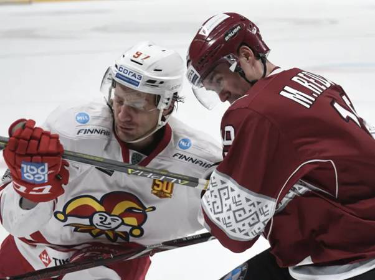North Americans playing for European club teams often have to wait for their money to clear the international banking system and a new company is working to change that.
As an agent who specializes in finding jobs for North American imports on European teams, Pat Curcio has seen it all. And while pros can have great experiences and make good money in Europe, sometimes accessing that money can be difficult.
“It’s always been a headache,” Curcio said. “Finding a bank, going to the bank, paying to get the money wired, worrying about fluctuations in currency, waiting for weeks for the money to arrive in North America when you need it quick – all these things have been difficult.”
Recently, things have gotten even worse. With Russia becoming a pariah state over the invasion of Ukraine, the nation’s banking system has been isolated and cut off from SWIFT codes, used in international transactions.
“We’ve had problems with Players getting paid in Russia for years,” Curcio said. “Players were signing over power of attorney to their taxi driver hoping he would go to the bank to wire their money home because their visas had expired and they had to leave.”
In Sweden, taxes are so high that teams will pay imports “sign-on money” – essentially a bonus where the player gets a percentage of their contract in advance before they enter the country – but they have to wait a couple of weeks before they enter while the money arrives in North America. Then there’s a ‘sign-off’ bonus at the end of the season, but the player has to leave Sweden before they collect – and then they can’t return for six months.
So what’s the solution? Maybe players could get paid in cryptocurrency.
Curcio is part-owner of LOCKER Token, a company that, among other crypto-based financial services, allows players to get paid in crypto – meaning they can access their money faster and simplify the process for their teams as well.
On top of North American imports such as Jayce Hawrlyuk, Cory Emmerton, and Justin Azevedo, LOCKER has also attracted NHL ambassadors including Tyler Seguin, Vince Dunn, and Nolan Patrick. And it’s not just the players who are intrigued.
“Teams are excited because they see the benefits of how much easier it is to move money,” Curcio said. “We’re in the early stages, but we’re close to announcing our first partnerships with teams and potentially an entire league.”
It cannot be understated how much the convenience factor of the money transfers is here. Former New York Rangers prospect Danny Kristo played for teams in multiple European countries in the past few years and at one point still had a pre-Covid bank account in Sweden that he couldn’t access unless he showed up in person. Then there’s the wild ordeal Curcio’s client Kerby Rychel had to go through after a brief (and chilly) stint with Neftekhimik in the KHL. Rychel left Russia for the AHL, but getting his money was another matter.
“He had six figures in the bank over there and no way to get it,” Curcio said. “But he had a bank card that allowed him to take $2,000 a day. We were worried they would freeze the card, so every day for two months, he went to a bank machine in Ontario and took out $2,000 in cash, so eventually, he was able to drain out all the money, less all the fees – which might have been $15,000.”
So that’s not ideal. And while we may not see as many imports in the KHL next season, there will still be a lot of North American players in Europe and many of them will want to have access to their paychecks as quickly as possible. As the world learns more about cryptocurrency, it will be interesting to see how it impacts the sports landscape.
“Players want full control of their funds in the palm of their hands,” Curcio said. “The adaptation is going to happen, I just can’t predict how fast. But it won’t be long: We’re headed in that direction.”
To learn more about Locker Token visit www.locker-token.com
The LOCKER mobile app is available on the Google Play & iOS App Store and consists of a user-friendly noncustodial wallet with many unique features that make it easy to get involved in the new world of blockchain.


Top site ,.. amazaing post ! Just keep the work on !